2021 Outlook
Island Officials and Community Influencers.
Gilbert S.C. Keith-Agaran and Alfredo G. Evangelista, Assistant Editor
New Year 2021 exploded with the usual persistent weeks of literal evening fireworks shows—loud, disruptive displays scaring family pets and keeping residents with allergies in-doors, as much as effectively chasing away any bad spirits lingering from the prior year.
2020 upended ordinary ways of living, especially trying to stay in business or on the job or simply maintaining family and social ties. While the quick development of effective vaccines may restore some normalness by the Fall, September still seems a long way off. This winter also began the slow slouching towards the end of the tumultuous administration of the 45th President of the United States, Donald J. Trump. Hawai‘i predictably voted for former Vice-President Joseph Biden but Trump did improve noticeably his support in the islands. Locally, voters elected one new County Council member and re-elected the remaining Council incumbents and the entire Maui legislative delegation. While at press time, the fallout from the insurrection disrupting the ministerial certification of the Electoral College vote by Congress on January 6th is far from clear (the FBI recently warned of “armed protests” at all 50 state capitols and the U.S. capitol for the week leading to the Biden Inauguration on January 20th), locally elected officials and community influencers appear more optimistic about the coming year.
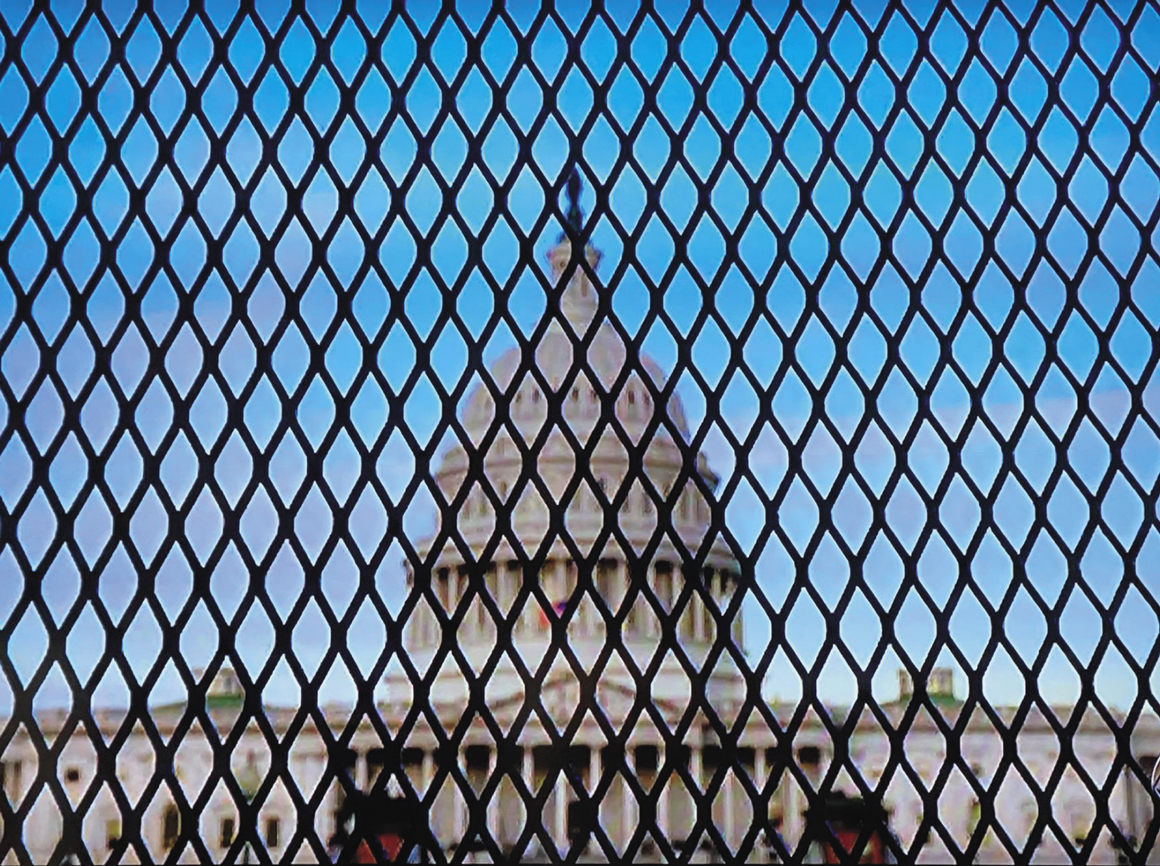
Screen Shot: Gilbert S.C. Keith-Agaran
The state remains under amended and re-issued emergency proclamations from Governor David Ige, with Maui Nui local rules from Mayor Michael Victorino. The lockdowns and limits on business operations and gatherings depressed Hawai‘i’s economy as the State unemployment rate remains among the largest in the nation. The testing requirements and mandatory quarantine for travelers severely hampered the main economic engine of transpacific tourism and economists expect little growth in the near term.
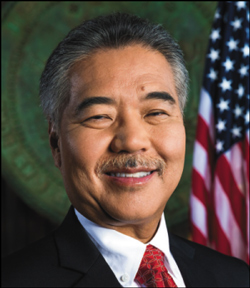
But Ige notes, “I’m very optimistic about the outlook for Hawai‘i’s economy. There is a lot of interest in Hawai‘i as a travel destination right now. I think COVID-19 has strengthened Hawai‘i’s brand of being a safe and healthy place to visit. It will be a challenging recovery period but we can do it if we continue to work together.” The State Council on Revenues raised the projection for the last half of 2020 but reduced the expected rate of growth for 2021—in short, the State Legislature and the Governor must still deal with a more than billion dollar shortfall in the State general fund budget.
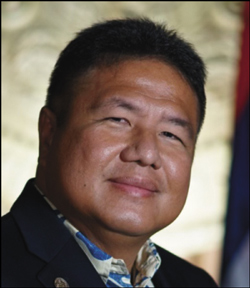
State of Hawai‘i Department of Transportation Director Jade Butay, one of only two Ige Filipino Cabinet members, concurs with his boss’ assessment: “With the advent of the safe travels program and the lifting of the mandatory quarantine for arrivals, tourism has increased, albeit in much smaller numbers than in the recent past. However, this indicates demand for travel to Hawai‘i remains. It is probable that the demand for travel will continue to increase as vaccinations make people more comfortable with travel.” Consequently, Butay thinks “While the pandemic has had an enormous impact on the state, current trends and developments present a clear path to recovery. The roll-out of the new vaccines is especially promising as this represents a concrete step towards containing the pandemic permanently. While it will take time to inoculate enough people to totally stop the spread of the virus, the vaccine offers the promise that the virus will be contained soon rather than at some indeterminate time in the future. This has been a boost to business and consumer confidence and offers encouragement to plan for a future more akin to what we experienced before.”
Further, Butay recognizes the efforts throughout the local and business community in adapting to the restrictions, “Delivery options, telecommuting, wearing masks in public, social distancing and other lifestyle changes have become the ‘normal.’ These adaptations have allowed many businesses to maintain some level of operations.”
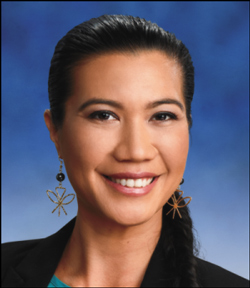
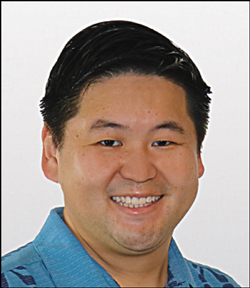
Maui Councilmember Keani Rawlins-Fernandez, the only Councilmember of part-Filipino ancestry and recently tapped to remain Budget Committee chair by her colleagues, commented, “I feel cautiously optimistic for our County’s capability to maintain a level of self-sufficiency for our operations of public services such as utilities, infrastructure maintenance, emergency services, and social services in this new year.” Wailuku State Representative Troy Hashimoto noted Maui’s greater economic dependence on tourism added to the COVID-19 imposed challenges locally: “We all have made sacrifices over the last ten months but I have seen the strength of our communities’ spirit and I remain optimistic about our future … My hope is that the worst is behind us and things can only get better.”
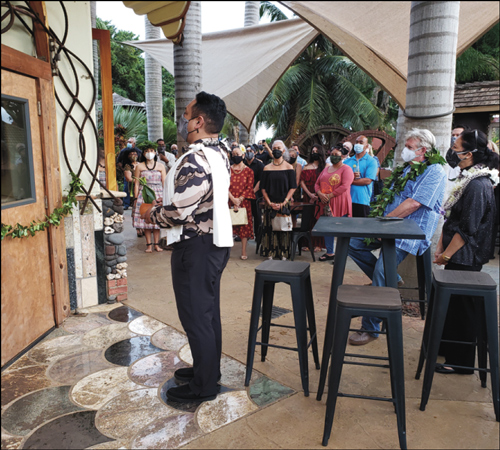
Photo: Alfredo Evangelista
One example of a business being optimistic is Cafe O’Lei. Dana Santibanez and her family took over The Mill House restaurant at Maui Tropical Plantation which closed during the pandemic. The new restaurant Cafe O’Lei at The Mill House will be open for lunch and dinner from Tuesdays through Saturdays and will feature many Cafe O’ Lei favorites and several new items as well. At the blessing held on January 8th, Santibanez explained the family’s business forecast: “In hard times, there will be opportunities and we need to find them.”

Another new business venture involved the release of Kāwili, an album of 13 songs: 11 Ilokano, Tagalog and Visayan folk songs re-imagined as Hawaiian language mele and two well-known Hawaiian mele—Aloha ‘Oe which is still performed at funerals in Ilocos—taken back by returning Sakadas—and Hawai‘i Aloha, the Ilokano rendition. Local attorney Lance Collins is a co-producer of the album and explained, “while Hawaiians and Filipinos share connections in history, material culture and cultural practice, those connections have been limited by racial hierarchies and settler colonial logics established by long-shuttered sugar plantations, yet still continue to live on through the residue of those policies.” According to Collins, the pandemic caused delays in the project and necessitated changes in some of the artists. But the project which benefits the Refugee & Immigration Law Clinic at the William S. Richardson School of Law and the Ilokano Language and Literature Program at the University of Hawai‘i at Manoa pushed through. “We decided not to further delay because we don’t know when the pandemic will end,” explained Collins.
Ige also noted “more and more of our residents are getting their vaccinations and we will continue to aggressively administer the vaccines as we receive them.” As a result, Ige “believe[s] the visitor industry will have a better year this year than last and the distribution of the vaccines brings us closer to getting back to a new normal in 2021.”

Recently, Maui Health announced the expansion of their COVID-19 Vaccination Clinic to include Hawai‘i residents that fall within the CDC identified Phase 1A and Phase 1B vaccine prioritization timeline. “We are excited to offer this life-saving vaccine to Hawai‘i residents,” said Mike Rembis, Maui Health chief executive officer. “It is critical we do everything we can to help vaccinate as many of our residents as possible to help stop this virus from causing additional harm.” The Vaccine Clinic, located at the main lobby of Maui Memorial Medical Center will be open seven days a week from 7:30 a.m. to 8 p.m. and has begun accepting online appointments for the identified groups.
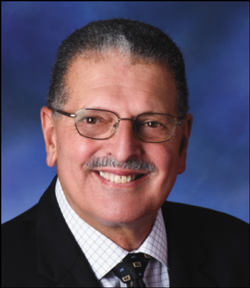
Maui saw a recent spike in the number of COVID-19 cases, causing Mayor Michael Victorino to reduce the size of social gatherings from ten folks not in the same household to five. Restaurants were also limited to one-third of their capacities. The increase in COVID-19 cases also caused schools in the Maui-Baldwin-Kekaulike District to continue virtual classes rather than shift to planned blended instruction.

“Maui High School’s current plan for 2021 is to continue as status quo and hold primarily virtual classes until we are assured that we can bring everyone back in a safe manner,” said Jamie Yap, principal of Maui High School. “We have learned to not get too ahead of ourselves in planning since the direction of the pandemic changes quickly.”
The Maui Interscholastic League also announced a cancellation of all the 2020 fall sports such as football and basketball. “Maui High expects to eventually hold all sports, fundraisers, dances and competitions based on safety,” explained Yap. “Some events may be virtual, some may have to be cancelled and others might be postponed for a safer time. These decisions are driven by the pandemic. Our mauihigh.org website and social media pages are always up-to-date with information about happenings at MHS.”
The need to be flexible is paramount. “The Maui High Sabers are resilient and flexible and have learned a lot in 2020 about how to adapt to the current challenges,” said Yap. “We will continue to do so throughout 2021. Distance learning is going well for most and has forced everyone to teach and learn in new ways. Many of the skills we have learned will be useful when we come back to campus.”

Central Maui Representative Justin Woodson, who will chair the key House Education Committee in the session beginning January 20th, is bullish: “I am optimistic because I have confidence that the approved COVID-19 vaccinations will ultimately lead to businesses reopening which will lead to more business activity over the course of the year.” Rawlins-Fernandez cautions, “With this pandemic, we’ve learned a lot about how our government tended to place all our taxpayer eggs in one tourism industry basket and that prioritizing only one industry over all else is not a sound nor stable investment strategy. The result has been an astounding number of residents who find themselves unemployed and worried about the future of their job stability.”
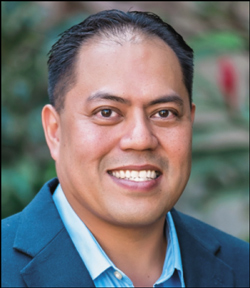
Chris Rabang, general manager of Westin Nanea Ocean Villas, described the hotel’s outlook and growth as slow and steady. “While we are nowhere near the occupancies of the same time last year, we are still half full and was able to bring a majority of our associates back from furlough. The safety of our associates and our guests will continue to be a major priority and focus for us. We have modified our resort and restaurant offerings to be consistent with State and County mandates, as well as our corporate guidelines,” said Rabang. He understands changes must be done to stay in business. “Like many other businesses, we have to remain open to change and think about how we do business different. Unfortunately, some of those decisions may include ceasing certain offerings indefinitely. Across the board, from luggage assistance to cleaning rooms to food & beverage, it’s just a different business model. At the end of the day, we will need to provide genuine experiences and provide authentic service in spite of the limitations in offerings. I have always said that you can have a comfortable bed, in a great room, with an amazing view of the ocean … but it’s the people that make the difference and will keep our guests returning. I am blessed to be working with a team of associates that share this belief and will go out of their way to providing this genuine and authentic experience—in a safe way!”
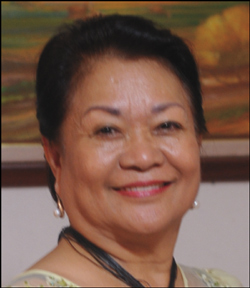
But the outlook for Maui’s Filipino community organizations’ various events may not be as rosy. “Due to the pandemic, there has been many restrictions with activities and projects we originally arranged and planned for,” said Emerita Cortez, president of the Maui Filipino Community Council. Initially, Cortez did not anticipate cancelling the 2021 Miss Maui Filipina Scholarship Pageant but a Facebook post noted the cancellation.
“While it remains a fluid situation, the Maui Filipino Chamber of Commerce intends to continue with our planned annual events,” said Rabang, newly installed president of the Maui Filipino Chamber of Commerce. “While we are hopeful that we will be in a better place as the year progresses, potentially we will need to postpone the Golf Tournament from the spring to the summer. While we would love to hold the Gintong Pamana Leadership and Scholarship Award Event in person, we may need to do that as a virtual event if there will still be limits on gatherings and social distancing.”
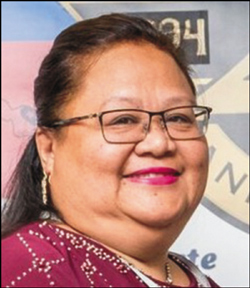
In 2020, Binhi at Ani hosted celebrations as virtual events. The pandemic forced Binhi at Ani to postpone last year’s 51st Annual Barrio Fiesta from May to September and eventually it was held as a virtual event in October. “We could not stop the continuity of the Barrio Fiesta after 50 years so we ventured into the world of virtual events and we used the opportunity to update the community of our ongoing projects and needs,” Binhi at Ani President Melen Agcolicol said. “We also created a new event—A Bayanihan Christmas, during which we celebrated three events—the Christmas season, Sakada Day and Rizal Day. We’re thankful for our sponsors, donors and the production team for two successful virtual events.”
Agcolicol hopes to have the Barrio Fiesta in May but recognizes it may be modified if COVID-19 continues to cancel events. “We’re very concerned if the Center will remain closed. We’re looking at creating a Saturday Market at Binhi beginning in the spring as another revenue source. That may also give our community organization partners an opportunity to make up for revenues lost due to a virtual Barrio Fiesta. We’re trying to think ahead and outside of the box,” explained Agcolicol.
“We also have to undertake a new program—Project Kuleana—where Binhi finally will undertake its responsibility of caring for the iwi located on its grounds. We’re really excited about this project,” said Agcolicol. “Like the Kāwili album release, we’re learning more about the interconnection between our Filipino culture and the Hawaiian culture. Kahu Wilmont Kahaiali‘i gave us an excellent history lesson when he blessed our renovated kitchen and the rest of the Center. We want to do more but it all depends on what happens next with COVID-19 and its reported mutations.”
Cortez is hopeful. “With the newly developed vaccination for this virus, I am hopeful and optimistic for a better year. It is evident that there have been struggles in Hawai‘i’s economy which has impacted our community. Returning to normalcy is something that we could all look forward to.”
“I believe we are seeing the beginning of the end of the COVID-19 pandemic,” Woodson asserts. Woodson thinks the global and national dissemination of the vaccine will also afford Central Maui businesses to fully reopen, allowing people to go back to work and provide for their families.
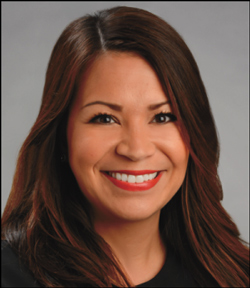
State of Hawai‘i Department of Human Services director Cathy Betts, the other Filipino in the Ige Cabinet, faces the daunting task of protecting the State social safety net as needs continue to grow. She notes the importance of maintaining “a level of hope and optimism.” She highlights the Consolidated Appropriations Act passed by Congress at the end of December will bring a new round of relief to assist Hawai‘i’s families. Betts points to a need to also focus on DHS’ internal and technological capacity to continue to meet the rising need in applications for services and benefits. At the moment, she does not anticipate cutting contracts with DHS’ community providers or non-profit partners. “We are hopeful we will be able to maintain continuity of needed services,” she says. “However, I know that our non-profit partners are struggling to make ends meet without more federal aid. These are organizations that are truly on the front line, serving those most in need and we are committed to working with them to help navigate this time together.”
Despite the Binhi at Ani Filipino Community Center itself losing $7,000 in revenues each month since the pandemic, Binhi at Ani undertook an ambitious program in May—the #BayanihanFoodDistribution. “We’re very proud Binhi undertook this program despite our own needs,” explained Agcolicol. “We joke how it started as Marilyn Oura’s dream and became a nightmare of hard work and ultimate dedication but thanks to our community partners such as the County of Maui and Maui Foodbank and our hundreds of volunteers, we raised over $42,000 and distributed 6,033 food boxes which included 5,404 plate lunches, 55,422 canned goods, 62,694 pounds of produce, 15,769 beverages, 3,029 bags of rice, 1,000 turkeys, 10,577 packages of noodles, 2,221 dozens of eggs, 6,200 McDonalds certificates, 21,702 snacks, 4,500 Maui Gold pineapples, 2,500 dragon fruit, 2,106 containers of spaghetti sauce, 1,968 boxes of mashed potatoes, 720 gallons of milk and other miscellaneous items such as toilet paper, coffee, goat cheese and masks.”
Agcolicol said Binhi will continue to embark on new programs. “In February, we will launch our weekly #BayanihanFeedingProgram where different teams will prepare lunches for senior citizens.” Agcolicol notes how Binhi has been blessed for not thinking of itself but taking steps towards really serving the community. “Out of the blue, folks call us up to volunteer to assist—even those who are visiting from Seattle and San Francisco. We still need donations to help with our own projects so we had to initiate Take-Out Tuesday as our own fundraiser to meet our monthly expenses. It’s not easy with all the protocols.”
The “new normal” indicates social distancing protocols and mask wearing will still play important roles for the near future. Residents can expect additional changes in how government provides services and businesses interact with customers.
“I’m really proud of our public servants who choose to work for the State of Hawai‘i,” Ige says. “Virtually everyone has had to change what they do and how they do it in light of this pandemic. We put serving the community first. We know that the demand for government services and support increases during times of crisis, and I believe our public servants have responded well.” Betts recounts, “DHS was able to quickly assess the rising need for benefits and services. We worked internally to build the capacity and apply for all necessary federal waivers to shore up our staff’s capacity to focus on getting services out to the residents who most needed them, all with very quick turnaround.” DHS applied for and received Coronavirus Relief Funds to quickly modernize its systems so that 1) telework could be supported and 2) residents could access applications for benefits online or over the phone. Staff responded to exponential increases in applications. “We aggressively procured PPE to provide to our 84 statewide offices as well as to contracted providers,” she says. “We quickly made the switch to telework, such that up to 90 percent of DHS divisions were able to efficiently telework without having to be in an office space.” DHS also disseminated more than 11.6 million dollars in childcare grants for providers through a grant with the Hawai‘i Community Foundation, increased the maximum childcare subsidy amounts to families and dispersed additional federal benefits to families in need, including two rounds of pandemic EBT for children who were enrolled in the free or reduced lunch program. “I anticipate that with more federal aid, we will be able to continue serving residents quickly and efficiently into the new year,” Betts promises.
Even Butay’s sprawling agency has been impacted by the economic doldrums. As a special funded department, the HDOT’s revenues remain directly tied to the user fees for the state’s infrastructure and facilities at harbors and airports. During the pandemic, the HDOT has learned how to maintain critical infrastructure and services while adapting to the new paradigm of increased health, safety measures and a sudden decline in revenues. To ensure the health and safety of the public and the department’s staff, various safety measures were implemented. For example, hands-free sanitizer dispensers were placed around department facilities and masks were distributed to personnel. Many offices moved to telecommuting and increased digital communications between offices to minimize risk. With the pandemic ongoing, Butay expects the department will continue to implement these measures and seek to improve conditions to ensure the well-being of the state’s transportation system users and personnel.
Hashimoto says his office has continued to serve his district throughout the pandemic without any interruptions. Other aspects of State government, however, have had more challenges in pivoting. With the upcoming budget shortfalls, Hashimoto hopes it will force each Department to rethink how they are operating and possibly streamline government in a positive way.
Hashimoto notes because of the pandemic for the first time, the Legislature will allow for remote video testimony on pending legislation. “This is very important for neighbor island residents who will now have equal access to sharing your voice on pending bills and hopefully will assist in creating better pieces of legislation,” he says.
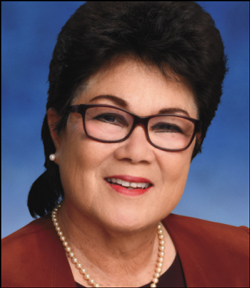
The Maui County Council, which meets year-round, moved to virtual meetings as the County Building closed during the early part of the lockdown. Wailuku councilmember Alice Lee, recently re-elected as Council Chair by her colleagues, notes: “We were among the first municipalities to move online for our council and committee meetings. As a result, we have not only been able to provide uninterrupted service to the citizens of Maui County but we have increased their ability to participate in the process as well.” Budget Chair Rawlins-Fernandez added “Community feedback on the transition to remote meetings have been overwhelmingly positive, commending the Council for not skipping a beat in providing transparency and opportunities to meaningfully engage in decision-making on all issues.”
Maui’s Filipino non-profit organizations such as Binhi at Ani, the Maui Filipino Community Council, and the Maui Filipino Chamber of Commerce have all learned how to do virtual meetings. “Since March our Board meetings and committee meetings were held on-line via ZOOM,” said Agcolicol. “It was initially confusing but we’ve learned how to meet the challenge head on.”
“Communication has been a challenge,” reported Cortez. “However, MFCC has been adapting to this challenge by continuing with scheduled meetings through the use of ZOOM or other forms of online meeting platforms. Due to social distancing requirements, engaging in community involvement is one of the biggest challenges. Thus, I plan to communicate with members and officers (existing and incoming) to insure transparency of information.”
“Our Board of Directors meetings have been done virtually,” said Rabang. “We have also conducted our Business Mixers throughout the year virtually, but towards the end of last year, the content remained as relevant in these trying times. Having speakers representing the Liquor Commission and Travel Industry was beneficial to local businesses across the island. We will need to be agile through this pandemic and socio-economic changes on Maui to ensure we represent local businesses and the Filipino community in the best possible way.”
Ige recognizes there have been challenges with unemployment insurance due to the State’s old and antiquated computer system. “Still,” Ige says, “those in the UI office have found innovate ways to work around the limitations of an aging system, established new programs quickly and found solutions to continue to support the unemployed.”
Similarly, Woodson notes over the last couple of months, more communications have shifted virtually, “primarily transitioning to more online communication platforms.” Lee adds, “We will continue to look at ways to improve as we navigate this new path forward. Our goal is to continue to provide accessible online meetings to keep our community connected to the legislative process while prioritizing health and safety.”
Lee says like many other organizations, the council’s management and staff have quickly adjusted to working remotely, as the Council’s concern for everyone’s health and safety remains paramount. “This change has presented many opportunities for positive change,” she says. “We have shown an ability to respond to challenges presented by a crisis while increasing accessibility to legislative participation and improving the way we communicate and share information with our constituents.”
Rawlins-Fernandez believes the shifts initiated in the last County budget put local government in good position going forward: “I think Maui County finds ourself in a good position to tax equitably, in order to better prioritize and provide more for our residents who need it most. Our recent tax reform efforts have already positively impacted and leveraged our ability to sustain a level of normalcy for these taxpayer-funded services, as well as helped us maintain one of the highest bonding ratings possible,” she asserts. Pointing to housing, Rawlins-Fernandez notes, “Taxation has influenced the recent boom in housing sales by offshore investors parting ways with Hawai‘i, which offers greater opportunity for our own residents to explore the prospect of homeownership, as well as an increase to our residential workforce rental housing inventory.” Consequently, she anticipates this trend growing in the next decade, noting “We recently passed tax incentives for long-term rentals and intend to further expand these efforts with new affordable long-term rental incentives as well.”
Further, Rawlins-Fernandez believes the County should continue towards more self-reliant economic models: “Investing now in food security, vocational education opportunities for employment openings in diversified industries such as technology, medicine and in skilled and unskilled labor industries such as construction and maintenance in both the public and private sectors, will enable our growth toward realizing a circular economy without much reliance on outside economic trends that tend to negatively impact our own stability in times like these.”
Butay adds, “Aside from dependence on the visitor industry, our economy needs to diversify in other areas such as diversified agriculture and aquaculture to be more self-reliant on food supply. Our harbors system is at the heart of supporting the needs of our population. An estimated 80 percent of all goods consumed in Hawai‘i are imported, of which 99 percent of imported goods arrive through the commercial harbor system. We also have to capitalize on high technology and the quality of life offered in our island state. Advancing high-tech sectors in the state and capitalizing on high technology by promoting broadband high-speed internet service, astronomy, renewable energy (wind, solar, hydro, geothermal, tidal, biomass), among others, especially when people can now work from home and anywhere. We should attract the best high-tech innovators to work and live in the state, given the quality of life offered in the state.”
Economic diversification has been the State’s mantra since the Ariyoshi years … but something always interfered.
In this case, along with lingering effects of the ongoing pandemic, 2021 also began with signs of the continuing partisan divide in our country.
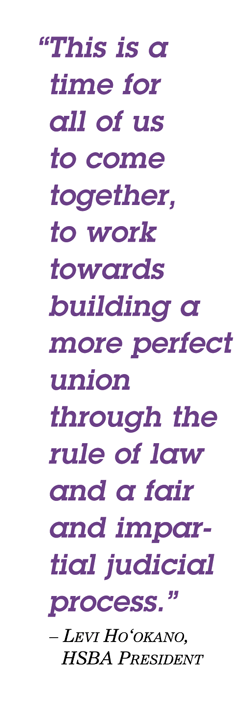
Will the hopes and dreams matter if our democracy continues to be challenged by insurrectionists or those plotting a coup d’état? On the day after January 6, Levi Ho‘okano, the new president of the Hawai‘i State Bar Association wrote: “The actions yesterday by the riotous group at the U.S. Capitol runs contrary to our freedom to peacefully protest and assemble. Constitutional protections and procedures are a delicate fabric that we, as citizens and especially as lawyers, must uphold if democracy is to survive. This is a time for all of us to come together, to work towards building a more perfect union through the rule of law and a fair and impartial judicial process. As President of the HSBA, I ask that you join me in condemning the actions of those yesterday at the U.S. Capitol, and work to improve our community by working together to settle any difficulties we may face in a civil manner. Out of Many, One.”
 Gilbert S.C. Keith-Agaran (Bar # 4677) and Alfredo G. Evangelista (Bar #3373) practice law in Wailuku. They condemn the actions at the U.S. Capitol and hope everyone will work together to improve our community. E Pluribus Unum.
Gilbert S.C. Keith-Agaran (Bar # 4677) and Alfredo G. Evangelista (Bar #3373) practice law in Wailuku. They condemn the actions at the U.S. Capitol and hope everyone will work together to improve our community. E Pluribus Unum.
